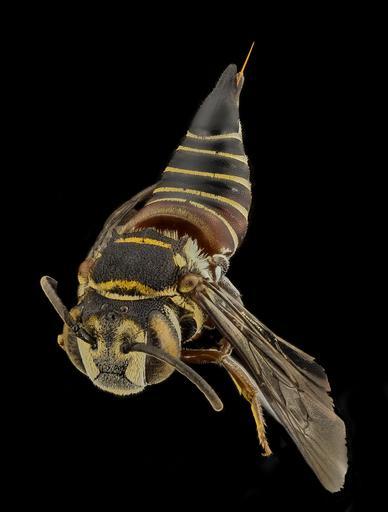MAKE A MEME
View Large Image

| View Original: | Coelioxys_cayennensis,_f,_argentina,_angle_2014-08-09-17.09.49_ZS_PMax.jpg (2632x3472) | |||
| Download: | Original | Medium | Small | Thumb |
| Courtesy of: | www.flickr.com | More Like This | ||
| Keywords: taxonomy:binomial=coelioxys cayennensis taxonomy:binomial=coelioxyscayennensis coelioxys cayennensis coelioxyscayennensis black background animal A lovely Coelioxys from Argentina...note the hair emerging from the eyeballs..one of the few groups of bee species to have this characteristic. (honey bees being the most famous hairy eyeball bees). A nest parasite of Megachile, this female is typical in shape of the abdomen, long and sharp designed to insert eggs into the walls of the other bee's nests. From the Packer Laboratory. ~~~~~~~~~~{{{{{{0}}}}}}~~~~~~~~~~ All photographs are public domain, feel free to download and use as you wish. Photography Information: Canon Mark II 5D, Zerene Stacker, Stackshot Sled, 65mm Canon MP-E 1-5X macro lens, Twin Macro Flash in Styrofoam Cooler, F5.0, ISO 100, Shutter Speed 200 The murmuring of bees has ceased; But murmuring of some Posterior, prophetic, Has simultaneous come,-- The lower metres of the year, When nature's laugh is done,-- The Revelations of the book Whose Genesis is June. -Emily Dickinson Want some Useful Links to the Techniques We Use? Well now here you go Citizen: Basic USGSBIML set up: www.youtube.com/watch?v=S-_yvIsucOY USGSBIML Photoshopping Technique: Note that we now have added using the burn tool at 50% opacity set to shadows to clean up the halos that bleed into the black background from "hot" color sections of the picture. www.youtube.com/watch?v=Bdmx_8zqvN4 PDF of Basic USGSBIML Photography Set Up: ftp://ftpext.usgs.gov/pub/er/md/laurel/Droege/How%20to%20Take%20MacroPhotographs%20of%20Insects%20BIML%20Lab2.pdf Google Hangout Demonstration of Techniques: plus.google.com/events/c5569losvskrv2nu606ltof8odo or www.youtube.com/watch?v=4c15neFttoU Excellent Technical Form on Stacking: www.photomacrography.net/ Contact information: Sam Droege sdroege@usgs.gov 301 497 5840 A lovely Coelioxys from Argentina...note the hair emerging from the eyeballs..one of the few groups of bee species to have this characteristic. (honey bees being the most famous hairy eyeball bees). A nest parasite of Megachile, this female is typical in shape of the abdomen, long and sharp designed to insert eggs into the walls of the other bee's nests. From the Packer Laboratory. ~~~~~~~~~~{{{{{{0}}}}}}~~~~~~~~~~ All photographs are public domain, feel free to download and use as you wish. Photography Information: Canon Mark II 5D, Zerene Stacker, Stackshot Sled, 65mm Canon MP-E 1-5X macro lens, Twin Macro Flash in Styrofoam Cooler, F5.0, ISO 100, Shutter Speed 200 The murmuring of bees has ceased; But murmuring of some Posterior, prophetic, Has simultaneous come,-- The lower metres of the year, When nature's laugh is done,-- The Revelations of the book Whose Genesis is June. -Emily Dickinson Want some Useful Links to the Techniques We Use? Well now here you go Citizen: Basic USGSBIML set up: www.youtube.com/watch?v=S-_yvIsucOY USGSBIML Photoshopping Technique: Note that we now have added using the burn tool at 50% opacity set to shadows to clean up the halos that bleed into the black background from "hot" color sections of the picture. www.youtube.com/watch?v=Bdmx_8zqvN4 PDF of Basic USGSBIML Photography Set Up: ftp://ftpext.usgs.gov/pub/er/md/laurel/Droege/How%20to%20Take%20MacroPhotographs%20of%20Insects%20BIML%20Lab2.pdf Google Hangout Demonstration of Techniques: plus.google.com/events/c5569losvskrv2nu606ltof8odo or www.youtube.com/watch?v=4c15neFttoU Excellent Technical Form on Stacking: www.photomacrography.net/ Contact information: Sam Droege sdroege@usgs.gov 301 497 5840 | ||||